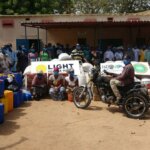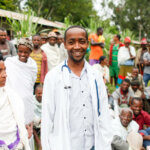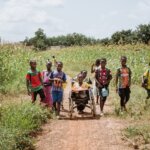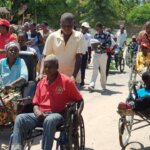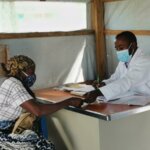- Disability Rights
The COVID-19 pandemic has changed the lives of billions, and it has reminded us of our interdependency around the world. We are grateful for our strong programme partnerships which have endured the toughest of external challenges.
In Burkina Faso, we joined hands with the Islamic Development Bank and Islamic Solidarity Fund for Development – the bank’s poverty alleviation arm – to get immediate help to the communities hit hardest by the COVID-19 crisis. Women, men, girls and boys with disabilities are at the centre of this initiative.
Elie Bagbila, Director of Light for the World Burkina Faso, has been part of this project from the start. “Thanks to this partnership we could react quickly when the crisis emerged and get support to where it was needed most. Together we are more effective in making the world a more accessible place,” he says.
Our humanitarian interventions include support to the national health system to protect vulnerable people; education support to enable children with disabilities to continue their learning; and provision of food and supplies to vulnerable families affected by income loss.

Mohammad Jawabreh who serves as Senior Programme Management Specialist at the Islamic Solidarity Fund for Development, says on this unique partnership:
“Burkina Faso has been hit hard by the COVID-19 health and economic crisis. Through our collaboration with Light for the World, we can save people’s lives, draw attention to the best practices of including people with disabilities in humanitarian responses, and ensure that no one is left behind.”
Ahmed Berthe, Lead NGO and Civil Society at the Resilience and Social Development Department of the Islamic Development Bank (IsDB) reflects:
“The COVID-19 pandemic has significantly tested the resilience of individuals and countries. The countries we support are facing high pressure on their healthcare systems, communities and citizens’ lives and livelihoods.”
“At the Islamic Development Bank, we saw invaluable merit in joining Light for the World and supporting people with disabilities during this difficult time.”

Celebrating partnership in the toughest of times, Elie Bagbila shares: “Inclusion is a path of learning. I am incredibly pleased to walk this path together with our allies at the Islamic Development Bank, local and international humanitarian agencies, government officials and, first and foremost, with the children and adults with disabilities in the communities we serve.”
Do you want to learn more about how to make humanitarian action disability-inclusive?
Read on:
How to include persons with disabilities in disaster response. A guide based on lessons-learned and good practices from Mozambique
This project was made possible with funding from the Islamic Development Bank and Islamic Solidary Fund for Development.
